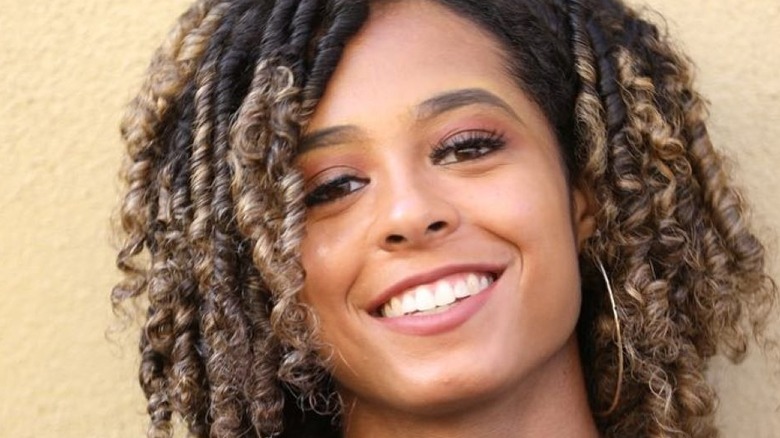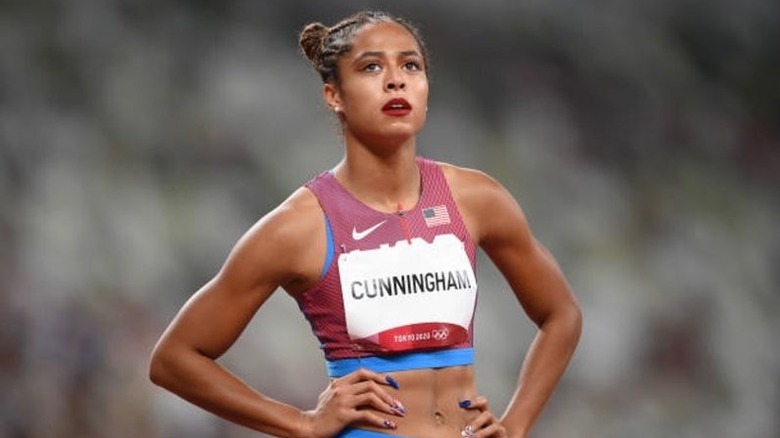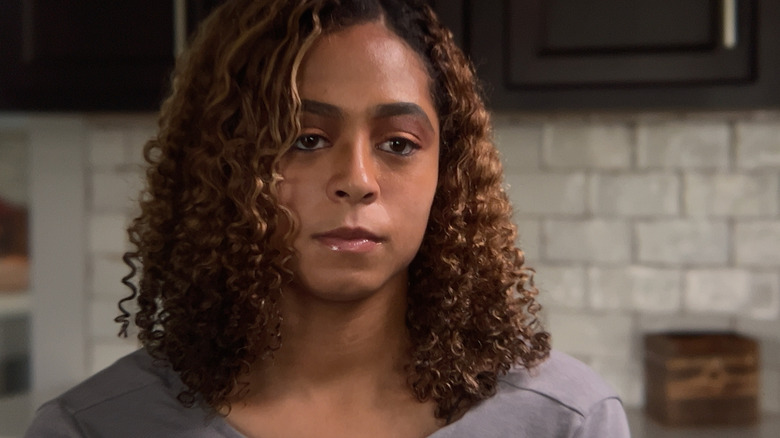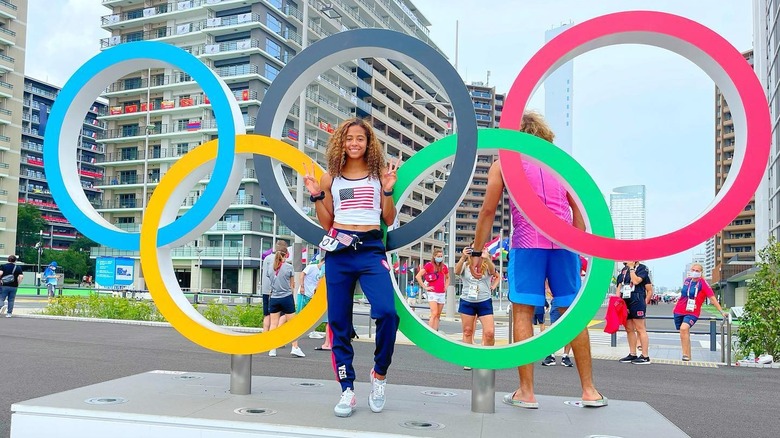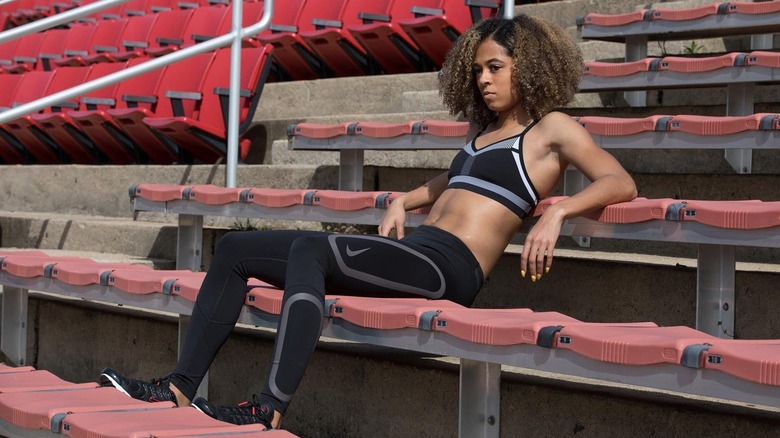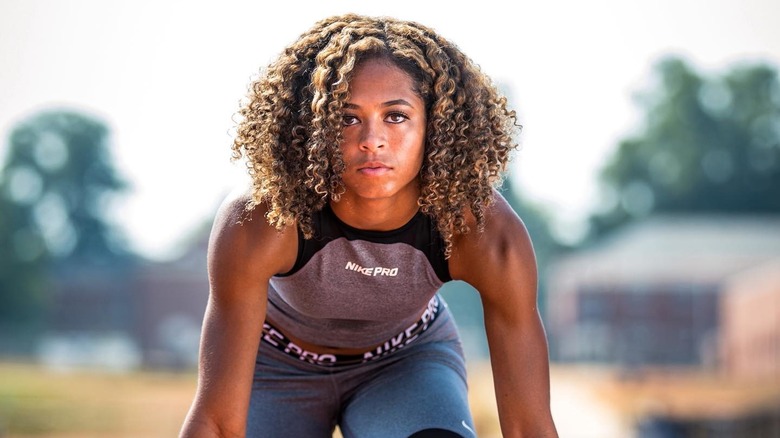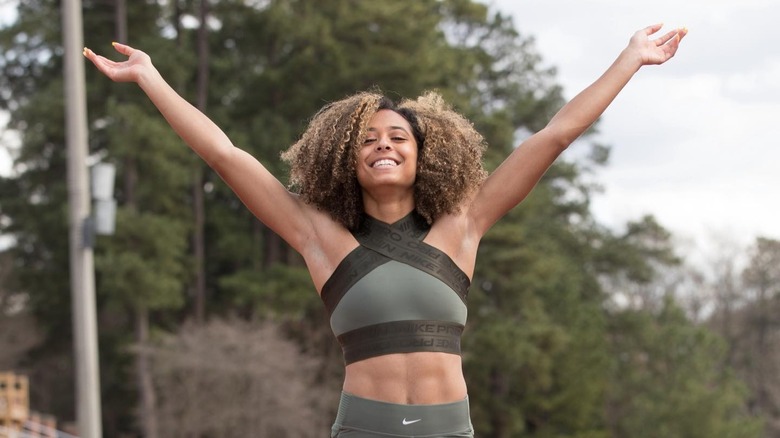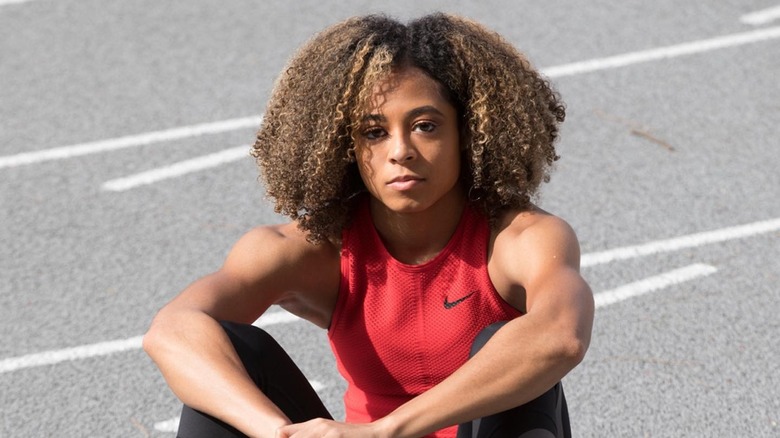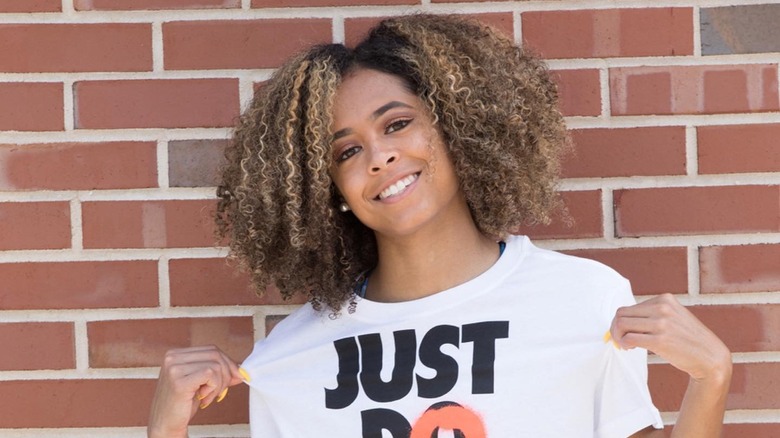Olympic Competitor Gabbi Cunningham On Mental Health, Social Media, And Her Fans - Exclusive Interview
This interview contains frequent discussion of mental health issues.
As soon as she began running in high school, Gabbi Cunningham dreamed of being an Olympian. She set her sights on the 2020 games in Tokyo and dedicated her whole life to making the team.
Her dream came true in July of 2021 when she was tapped to replace Brianna McNeal in the in the 100-meter hurdles Olympic event, per WCNC Charlotte. Richardson had been suspended after failing a drug test prior to the event. The suspension caused an uproar on social media with fans saying that the suspension was unfair, and Cunningham got caught in the crossfire. At what should have been one of the happiest moments in her life, Cunningham was dealing with a seemingly constant stream of negativity on social media. She later admitted that her mental health took a big hit as a result, and since then, she's been an advocate for athlete mental health.
In an upcoming documentary entitled "I'm Fine, (Not) Really," Cunningham and other elite athletes like Jackie Joyner-Kersee, Michael Johnson, and Tori Franklin frankly share how the pressures of living and working in the public eye, social media, and the changing relationship between athletes and sports fans has impacted their mental health. Ahead of the film's release, Cunningham spoke to Health Digest about the film, her career, and how she cares for her mental health.
If you or someone you know is struggling with mental health, please contact the Crisis Text Line by texting HOME to 741741, call the National Alliance on Mental Illness helpline at 1-800-950-NAMI (6264), or visit the National Institute of Mental Health website.
Falling in love with running and Olympic dreams
When did you start track and field and what did you love about it?
I started track and field... I don't even remember what year it was, but I know it was my freshman year in high school. I remember I actually, at first, hated to run. My brother and my dad would take me around the neighborhood and try to get me in shape so that I could try out for the team. I would stop all the time and be like, "Hey, this is not for me."
Once I started actually getting in shape and I went and I tried out for the team and I made it and I started competing, I fell in love with the idea of competing and the whole process of getting better at it and running faster each meet.
How did you know that you wanted to compete at an elite level?
Honestly, from the beginning, I wanted to. I remember my freshman year when I started, and I was at first running in Maryland, at the first school that I ran at. I remember we went on vacation or something and on the beach, I drew "Rio 2016." My parents have a picture of me, putting it on there.
From that time, I always wanted to go to the Olympics and be an Olympian. I knew that 2016 was pushing it because I had just started, but [I was] definitely shooting for 2020, and then making the team! It was definitely an accomplishment.
You always knew that you wanted to go for the Olympics! Did you shoot for any other competitions before that, or was it always right on for the Olympics?
As I started to run and I gained more knowledge of the competitions that were, in the meantime, before the Olympics, since that was far away in the scheme of things, making other USA teams ... When I was in college, I tried out for a few world junior teams and I made one of the junior teams that I had tried out for. I had the opportunity to compete in a USA uniform. That was definitely a great experience, running over in Peru, that's where we ran. That was the first time I was able to wear a USA uniform and represent the flag and everything.
After that, I focused on trying out for senior teams because I became too old to run for the junior teams. I tried out for one senior team before I tried out for the Olympic team. The Olympic team was the second senior team that I tried out for, and I made it! I strive for each mini goal in the meantime.
Social media and athlete mental health
How did you get involved with the "I'm Fine, (Not) Really" documentary?
I had Darryl [the director] reach out to me. I believe that he had gotten contact with a cousin of mine, and I don't exactly know how that interaction happened — if it happened because they saw that I had made the Olympic team and had that connection, or if he was trying to find someone that could contact me, and that kind of connection ended up happening... but either way, he ended up getting in contact with me and it all started with, at first, he wanted to do a basic interview. Then, this whole idea about this documentary came along.
He contacted me back and was like, "Hey, they actually want to do a documentary. Can I come and basically redo or do another interview for this documentary?" I was like, "Wow. That's an amazing idea. I'm definitely on board [and] willing to talk about it," especially coming off the Olympics and knowing the things, the emotions and stuff, that I was feeling during that whole entire time. To be able to tell a little bit of my part of the story too, after seeing Naomi Osaka and Simone Biles and what they were going through during that time, I felt like I could relate to it. I wanted to share how I was feeling as well.
In the documentary, you shared a lot about your experiences with social media leading up to the Olympics. How has social media influenced your experience as an elite athlete?
I feel like it's changed over time. As an elite athlete, I like having the platform because I know that there's athletes out there, younger people, younger generations that are looking up to me, fans, no matter what age group, that support me. I like the ability of being able to post and have a platform and be able to speak to them and reach out and share what's going on in my life and different things with what's going on in the world.
Some people don't ever have the negative interactions that come with social media. I had never really experienced that before making the team. I've always had positive interactions on social media for the most part, and after making the team and saying on Twitter, "Hey, I just got the call that I had made the team!" The influx of negative comments that ... I had never experienced that before. For me, it was a lot.
I've never been a person that's been super into social media. I have it, but I don't let myself get consumed in it. I found myself constantly reading the comments and seeing what people were saying. It was a very sad ... It wasn't a very sad time because I had made the team, but the emotions for me were happy [and] sad at the same time because I'm like, "Wow, this is a big moment for me," and all these people are in my comments, going in on me for no reason during a time that's supposed to be happy.
The changing relationship between athletes and fans
At first, it was really hard for me, but at one point I had to get off of it, which wasn't too hard for me because ... Actually, leading up to the Olympic trials, I literally deleted all social media apps off of my phone for two or three months, so that I could clear my head and get focused on the task at hand. That helped really well. I was able to perform well and not have to worry about the progress I was seeing of other athletes or anything on social media, and it definitely was a good feeling.
I do know, being an athlete and having a platform and having fans, it's not something that you can make go away. You have to have it in order for you to speak out, so it's not like I completely have ever wanted to do away with social media. There's times where you have to give yourself those mental breaks or else it will drive you crazy.
Another really interesting thing that they address in the documentary is the way that social media is changing the relationship between fans and athletes. What do you think about that? How has social media kind of changed your relationships with the fans?
Social media has given them more of a personal feeling. It has allowed fans to get even more attached to an athlete at hand, instead of having that degree of separation. With social media, you can have direct contact with the fan, whether that's commenting or DMing. Yes, we can filter our DM's, but we can't necessarily filter our comments unless we cut it off. It has created a personal connection, which can be a good thing because you are able to ... I know I've had little girls reach out to me asking for advice. That's definitely the positive part of it, having parents and everything reach out to you and the positivity that they send.
The bad side is when they do have that direct line to you, people can say anything that they want and it's like you can do nothing about it. If you had a performance where you didn't perform well ... and social media has made the personal connection, but it has, in a sense, not created the healthiest relationship between athletes and fans or celebrities and fans.
How do you, personally, handle it when people say negative things about you online?
I try to take a step back. I will delete the app off of my phone or not get on it during those times, because it can be a lot. I know from experience that I've found myself sitting there reading every single comment that people make, and that is never good. It's hard because you can't take too much time away from it, but I, at least when moments like that happen, try to take a step back and regroup for myself.
Living and working in the public eye
How does it feel being in the public eye all the time while you're focusing on training really hard, focusing on competition? What is that like?
I've never had a problem with separating those two. I separate them in a way. I'm able to train without constantly thinking about what people in the public eye might think of me. I don't know if that's because of the way I've grown up. Before I ran track, I was into the arts. I would dance. I did competitive dance where I had to dance in front of crowds and everything. I've done talent shows where I've had to sing in front of crowds. Having the public eye there and having that background growing up has allowed me to be able to separate it.
There's some good things about having that opportunity to be in the public eye, because sometimes, it feels good to know that you have that type of stage. Sometimes, especially during the down moments, it's hard. You have to pull yourself away and be able to separate the two, and not necessarily worry about what everyone is saying about you in the public eye — which is easier said than done, I know.
I really try to focus on separating the two because if not, then it'll consume you and start to filter into your training, [which is] the part that has got you there. I try not to let it affect that.
You touched on this a little bit already, but what are some of the positive aspects of interacting with fans on social media?
Definitely, like I said, being able to connect with the younger generations and having them reach out, whether it's giving tips on running or tips on how they can handle different things in their life. I've had parents reach out to me where they're asking for tips or stuff for their children, or even...
I know I had a little girl reach out. She had a project that she had to do in her class, and her assignment was to actually be me, which was the craziest thing. I'm like, "Wow, they're actually talking about me in a classroom. That's crazy!" Her assignment was to be me, and so her mom reached out and asked if I could send a shirt or something signed. That was really cool for me to be able to help in any way that I can with the project or with giving tips.
Having the ability to, if there is an issue or topic that I want to touch on displaying that message out is a positive thing, being able to interact with them — the positive fans, being able to see their comments and their encouragement and everything, [including] being able to have the ability, in those down moments, to go back and look at that and know that there are still people out there that support you. Those are a few of the positives of having that close engagement.
Managing the pressure of expectations
Another thing that the documentary touched on a lot is the balance of all of these expectations that are put on elite athletes. How do you kind of manage and balance, the fans, the coaches, the sponsors, your own goals? How does that all play out for you?
That's something I'm still trying to work on. I get better as the years go on, the more experience that I get, the more people I talk to, and me asking them questions. I have younger athletes that ask me questions, but still, I am young in a sense. There's certain athletes that I might look up to, or even my coach. He's been in the places that I want to go, the places that I've been. Talking to him about it and how he managed, it helps a lot.
I do know that it's very difficult, especially because as athletes, we also have high expectations for ourselves. I'm pretty sure I said it in the documentary, just because we perform bad, doesn't necessarily mean that we're a bad person. We're human too. Nine times out of ten, if I'm being honest, expectations that the fans have for us, we probably have for ourselves. When we don't meet that, we're definitely hard on ourselves too.
That's where the problem comes, because we have those expectations. We don't meet them. We're having a down moment. We're hard on ourselves about it. You have other people coming and being hard on you about it too, and that's never a good thing. That is where the trouble of balancing all the expectations are, because you have them for yourself, and then everybody else is giving their input on their expectations too. It becomes overwhelming. Whether that's from sponsors, whether that's from fans, it's never a good feeling, not to reach the expectations that you have for yourself, that they have for you. It becomes very demanding.
I'm still trying to learn how to balance it. I've been getting better. I talk to family members, I talk to people that try to encourage me and give me support, and that helps a lot, but it does become hard sometimes.
How has balancing all of those expectations impacted your mental health at times?
It definitely causes me to have my highs and my lows ... it's very interesting because it can go both ways, where you have high expectations for yourself and the fans do too. When you don't perform well, they have negative things they want to say.
I've also had cases where I made it to the Olympics, I made it to the Olympic final. I personally wanted to medal. I didn't meet my expectations for that meet, and I was disappointed in myself and I had everyone around me. They were like, "No, you made it to the final, you're 'this' in the world. That is a great accomplishment!" I'm like, "Yes, I understand that, but it's still not what I wanted, and it's not where I want it to be." It definitely depends on the situation.
Caring for mental health to improve physical performance
To go off that a little bit, how does your mental health impact your performance on the track?
My coach always tells me that most of what we do is 80-90% mental and the rest is physical. I definitely have learned that over the years. I was never the athlete that necessarily was on top. Coming out of college, I hadn't made it to an NCAA final, like most of the peers that I ran against. Having the ability to, or having the drive to believe in myself, no matter how many failures I felt I had, remaining positive in those moments, which has been very hard, but it has made me mentally stronger. I have had so many moments where I didn't perform how I wanted to perform.
Definitely, for a while, I was not performing how I wanted to and having those failures really affected the way I run. It'll start to sometimes become a downward spiral, because you're constantly getting down on yourself. It feels like you're doing everything right, but nothing is coming together. I know that's a constant feeling that sometimes I have, even now [after] I've been to the Olympics. I had a great indoor season. The start of my outdoor season isn't necessarily going how I want it to go, but my mental health over time has gotten a little stronger. To be able to — in those moments, where I know that I've gotten out of a slump like this before — being able to pull on that helps me now with my mental health as I go into those races.
What kind of practices do you do to take care of your mental health, especially while you're training and competing and all of that pressure is kind of on?
When it starts to become a lot of pressure on me, I do take a step back from social media: Twitter, Snapchat, Instagram. I will completely delete it because I feel like it gives me a fresh restart. I also practice talking to my coaches, talking to my family members and my support team, my system that works around me, and their encouragement helps me a lot.
Also, I've had moments where I've read books. I will go and I will get... I've read... Before the Olympic trials, I read the whole "Mamba Mentality" book. That helped me, mentally, and watching motivational videos, having that positive reinforcement when you start to go into a slump so that every thought in your head ... sometimes you'll be sitting here and the negative thoughts will start to spiral. In moments like that, I will try to pick up a book that reinforces positivity or listen to some type of motivational video so that I don't start to get into the bad [part] of a slump.
Giving athletes grace under pressure
What do you wish the public knew about what it's like to be an elite athlete?
I feel like they think they have an idea of the amount of pressure that is on us, but they don't necessarily know. We have expectations for ourselves and then everyone else and everything else piles expectations on us too. That pressure builds up. Sometimes, it becomes so much that it pops for us as athletes. We never want to be the athlete that performs bad. If every athlete could have it perfect, where they won every race or every meet or anything that they did, yes, that's the way that we would want it too! It's life. Everything isn't perfect. We understand that's not the way, [and] it's not going to go our way every single time.
To know that when we have down moments for ourselves, we don't need the negativity of putting us down even more, because we've already done it ourselves. Whether they think it or not, they will say, "Oh, this athlete's throwing a temper tantrum, because they're crying." I know me, when I cry, it's probably because it's out of anger of how I did, not because I'm throwing some temper tantrum about, "I didn't perform well." I'm not being a crybaby. No, that's not the case. It's because I'm mad at myself because I felt I should have performed.
We know fans come out and they look for us to perform well. If you're their favorite, we know that. We already know that when we don't, it's a disappointment to ourselves and it's a disappointment for them. Telling the fans, in those moments, it's better to give us positive encouragement, not negative — that will help [us] not to feel like everything in the world is crashing down a bit on us because it already feels like that.
Removing the stigma around mental health
Why do you think it's so important for elite athletes to talk about their mental health?
I think the more we talk about it, the more there's not so much a negative stigma on it. So many times, and I know it's gotten better over the years, but especially with athletes, over my years, it hasn't necessarily been something that's talked about. The resources haven't always been provided to talk to a psychologist.
Even now, I know you will tell people, "Hey, if you don't feel you're performing well, you might have some type of mental block. You should go and talk to someone about it." They'll get really defensive like, "No, I don't need to talk to anyone. I'm fine." It's not a bad thing to have to talk to someone about it. When you have a problem, you go and you talk to your parents or you talk to your family members, you talk to your friends. It's the same thing. If you're having a problem as an athlete mentally with your sport, we have to keep reinforcing a positive stigma of that. It is okay to talk about those things!
We are taking steps in the right direction. When things happen, like what happened to Simone Biles, how everyone jumped on her about not performing for her mental health, or even Naomi Osaka, for taking a step back, that's when it becomes a major setback for the progress that was made. It's like, "Yeah, yeah, yeah. Mental health, be positive about it," and then moments like that happen and everyone is negative about it. It's like, "It's not okay to have a mental health problem." In those moments, people need to be more positive about it.
I feel that as an athlete, if you're having a mental slump or a mental health problem and you do need to take a step back, it's our career! I feel like it's our right to be able to do that. Someone shouldn't get mad about it. I know that's my personal opinion, but [it's a great idea to keep] constantly taking the steps that we're doing.
It is going in the right direction — having documentaries about it, constantly talking about it, having conversations and actually doing something actively about it because you can't only talk about it. You have to actually make change and actually provide those resources on every single level, whether it's middle school, high school. If you start it from the middle school age, then, the more the athlete grows, they'll become more comfortable with talking to psychologists and talking to people about their mental health problems.
Find your local station listings and airtimes for "I'm Fine, (Not) Really" at imfinenotreally.com. You can also visit mondocares.com to keep up with current initiatives, and follow them on Instagram at @MondoSportUSA and @MondoCares, and on Twitter at @mondocares.

